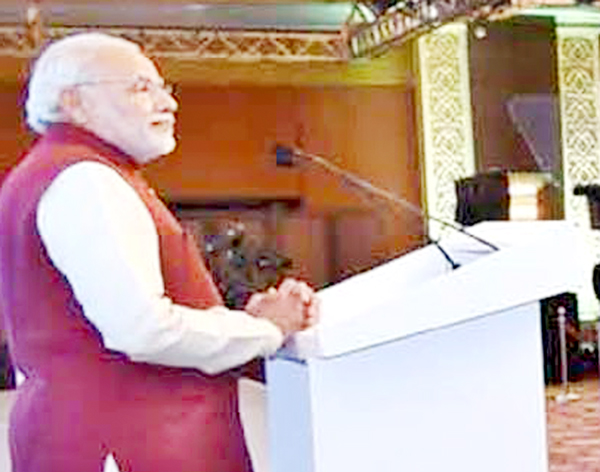
NEW DELHI, Jan 17:
In a clear message amidst the chill in bilateral ties, Prime Minister Narendra Modi today asked Pakistan to walk away from terror if it wants to have dialogue with India.
Outlining his approach for an integrated neighbourhood, Modi said his vision for country’s neighbourhood puts premium on peaceful and harmonious ties with entire South Asia.
“But, India alone cannot walk the path of peace. It also has to be Pakistan’s journey to make. Pakistan must walk away from terror if it wants to walk towards dialogue with India,” he said while addressing the participants at the Government’s geo-political flagship initiative “Raisina Dialogue-II”.
He also recalled several initiatives taken by him to normalise ties with Pakistan including travelling to Lahore.
There is a deep chill in Indo-Pak ties due to series of cross-border strikes including in Pathankot and Uri by Pakistan-based terror groups.
In an obvious reference to Pakistan, the Prime Minister also asserted that India’s belief in delinking terrorism from religion, and rejecting artificial distinctions between good and bad terrorism, are now a global talking point.
“And, those in our neighbourhood who support violence, perpetrate hatred, and export terror stand isolated and ignored”,” he said.
Referring to India’s ties with China, Modi, at the opening of the three-day Dialogue, said it was not “unnatural” for two large neighbouring powers to have some differences but both sides should show sensitivity and respect for each other’s core concerns and interests.
“I see the development of India and China as an unprecedented opportunity, for our two countries and for the whole world. At the same time, it is not unnatural for two large neighbouring powers to have some differences.
“In the management of our relationship, and for peace and progress in the region, both our countries need to show sensitivity and respect for each other’s core concerns and interests,” Modi said, adding he and Chinese President Xi Jinping have sought to tap the vast area of commercial and business opportunities in the relationship.
Asserting that the century belongs to Asia, he said the sharpest trajectory of change is happening in the continent and there are large and vibrant pools of progress and prosperity that dot the landscape of this region.
“But, rising ambition and festering rivalries are generating visible stress points. The steady increase in military power, resources and wealth in the Asia-Pacific has raised the stakes for its security.
“Therefore, the security architecture in the region must be open, transparent, balanced and inclusive. And, promote dialogue and predictable behaviour rooted in international norms and respect for sovereignty,” he said.
In his address, the Prime Minister gave a run down of India’s foreign policy priorities, security interests in the Indian Ocean and bilateral engagement with neighbouring countries, Gulf nations and major powers including the US, China and Russia.
He also emphasised that ‘Sab Ka Saath; Sab Ka Vikas’ is not just a vision for India but a belief for the whole world.
Nepalese Foreign Minister Prakash Sharan Mahat, former Afghan President Hamid Karzai, former Australian Prime Minister Kevin Rudd, and Gowher Rizvi, International Affairs Advisor to Prime Minister of Bangladesh, are among the nearly 250 foreign participants from 65 countries.
On Afghanistan, Modi said despite distance and difficulties in transit, India’s partnership assists in reconstruction, by building institutions and capacities.
“Amidst shifting politics, our security engagement has deepened. The completion of Afghanistan’s Parliament building and the India-Afghanistan Friendship Dam are two shining examples of our dedication to forge developmental partnership,” he said, adding the compelling logic of regional connectivity for peace, progress and prosperity.
In this regard, he cited two examples -the tripartite agreement with Iran and Afghanistan on Chabahar; and India’s commitment to bring on line the International North South Transport Corridor.
“However, equally, connectivity in itself cannot override or undermine the sovereignty of other nations. Only by respecting the sovereignty of countries involved, can regional connectivity corridors fulfil their promise and avoid differences and discord,” Modi added.
Talking about ties with the US, Modi also referred to his conversation with President-elect Donald Trump and said “we agreed to keep building on these gains in our strategic partnership.”
Asserting that instability, violence, conflict, extremism, exclusion and transnational threats continue to proliferate in dangerous directions, he said, “And, non-state actors are significant contributors to the spread of such challenges. Institutions and architectures built for a different world, by a different world, seem outdated. Posing a barrier to effective multilateralism.”
The Prime Minister said India’s maritime interests are strategic and significant and that the primary responsibility for peace, prosperity and security in the Indian Ocean rests with those who live in the region.
“Ours is not an exclusive approach. And, we aim to bring countries together on the basis of respect for international law. We believe that respecting Freedom of Navigation and adhering to international norms is essential for peace and economic growth in the larger and inter-linked marine geography of the Indo-Pacific,” he said without naming any country.
Delving on ties with Gulf and West Asia, including Saudi Arabia, UAE, Qatar and Iran, Modi said his Government has redefined, in a short span of time, and “despite uncertainty and conflict”.
“We have not just focused on altering the angles of perception. We have also changed the reality of our ties. This has helped us protect and promote our security interests, nurture strong economic and energy ties and advance the material and social welfare of around 8 million Indians,” he said.
The Prime Minister said India was pursuing its transformation in “unsettled times” as also when the world is going through profound changes.
“But, sluggish growth and economic volatility are also a sobering fact. Physical borders may be less relevant in this age of bits and bytes. But, walls within nations, a sentiment against trade and migration, and rising parochial and protectionist attitudes across the globe are also a stark statistic,” he said. (PTI)

